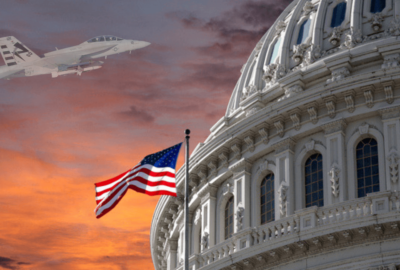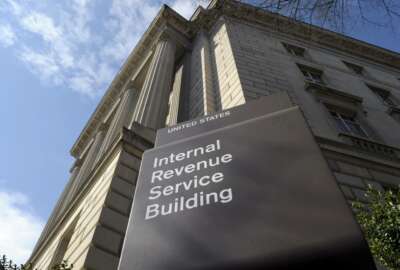Federal managers worried about implementing White House’s vaccine and testing policies
In today's Federal Newscast, federal managers say they need more guidance from the Biden administration about the new vaccine and testing policy for employees.
To listen to the Federal Newscast on your phone or mobile device, subscribe in PodcastOne or Apple Podcasts. The best listening experience on desktop can be found using Chrome, Firefox or Safari.
- Federal managers say they need more guidance from the Biden administration about the new vaccine and testing policy for employees. A coalition of federal managers says it’s worried about how their agencies will interpret and enforce vaccine and testing policy guidance from the administration. Groups that represent managers at the IRS, Social Security Administration and other agencies also say supervisors are overwhelmed with a growing list of responsibilities during the pandemic. They say some supervisors are leaving management roles or retiring altogether.
- The U.S. Digital Service is in the middle of a massive expansion and now has a new leader to oversee that effort. The White House named Mina Hsiang as the new USDS administrator, replacing Matt Cutts, who left in April. Hsiang previously worked at USDS during the Obama administration, helping to fix healthcare dot gov and then lead the HHS digital services office. Hsiang takes over USDS just after it received $200 million from Congress as part of the American Rescue Plan Act to add 110 new employees over the next year. (Federal News Network)
- President Biden picked the Merit Systems Protection Board’s current general counsel and acting executive as his third and final pick to serve on the board. Tristan Leavitt has been leading the MSPB since the board lost all its members back in March 2019. He also spent time at the Office of Special Counsel. And he’s a former staffer to Senate Whistleblower Protection Caucus Chairman Chuck Grassley (R-Iowa). Biden already picked two other nominees to serve on the board and restore a quorum. They’re waiting Senate confirmation. The board has been without a quorum for over four years.
- The Air Force’s chief software officer unloaded his frustrations with DoD on his way out the door. Nicolas Chaillan, the Air Force’s chief software officer, didn’t hold back with his thoughts about the cultural and process obstacles that continue to plague the Defense Department’s ability to modernize its technology. Chaillan announced he’s leaving after three years in the Air Force role with a scathing rebuke of the current DoD technology environment. Chaillan says DoD is stuck in outdated approaches and fails to empower its people to make real change. He says he’s leaving, in part, because he’s tired of continuously chasing support and money to do his job. (Federal News Network)
- The National Security Agency has a new director of research. Gil Herrera was recently tapped to lead NSA’s Research Directorate, which seeks to advance the science underpinning signals intelligence and cybersecurity. Herrera served nearly four decades at Sandia National Laboratory. He was also previously at the NSA from 2015 through 2018 as director of the lab for physical sciences. Herrera was also recently appointed to the U.S. National Quantum Initiative Advisory Committee.
- The government is looking outside for ideas to overhaul and modernize the federal workforce. The White House, together with the chief financial officers of the 24 largest agencies, issued a request for information. The General Services Administration is coordinating the effort. The request goes to what the GSA calls innovative learning content providers, online universities, business educators, tech companies and talent development vendors. The effort will eventually lead to a marketplace of education providers from which federal employees seeing to upgrade their skills can buy the training they need.
- NASA says it’s approaching the next several months as a experimental phase for employees and supervisors to hash out new work arrangements. Those arrangements can include telework and remote work options. Supervisors will approve the arrangements. But the agency says it’s encouraging supervisors to make those decisions based on what’s best for the job and the employee, not their own preferences. NASA says it’ll see what patterns emerge from this experimental phase before making investment and divestment decisions about office space and IT needs. (Federal News Network)
- The IRS expects to collect much more money than it spends, if Congress raises its budget. The IRS would collect $200 billion in additional revenue, and double its workforce, over the next decade. That’s if lawmakers go ahead with the Biden administration’s spending plan. That would give the tax agency $80 billion over 10 years. With this level of spending, the Congressional Budget Office expects audit rates would increase across the board, but higher income taxpayers would see the biggest increase. CBO also expects a modest boost in the number of taxpayers who voluntarily pay what they owe. (Federal News Network)
- The House Oversight and Reform Committee approved spending $12 billion to make electric vehicles a greater presence in the federal fleet. The committee voted on this spending as part of a $3.5 trillion budget reconciliation package. $7 billion would go to the Postal Service, which makes up about a third of all federal vehicles. Another $5 billion would go to the General Services Administration. The money would go toward purchasing electric vehicles and infrastructure like charging stations.
- The House is advancing a bill with new Buy American requirements. Agencies would see the requirement for American-made components in their purchases increase to 60% under the House Armed Services Committee’s version of the 2022 defense authorization bill. The Buy American requirements would eventually increase to 75% by 2029. But the provision’s ultimate success is not assured, as a similar measure was stripped out of last year’s defense policy bill before final passage. The committee voted the bill through to the full House earlier this week. (Federal News Network)
Copyright © 2025 Federal News Network. All rights reserved. This website is not intended for users located within the European Economic Area.
Eric White
Eric White is news anchor and Federal Drive producer at Federal News Network.
Follow @FEDERALNEWSCAST






